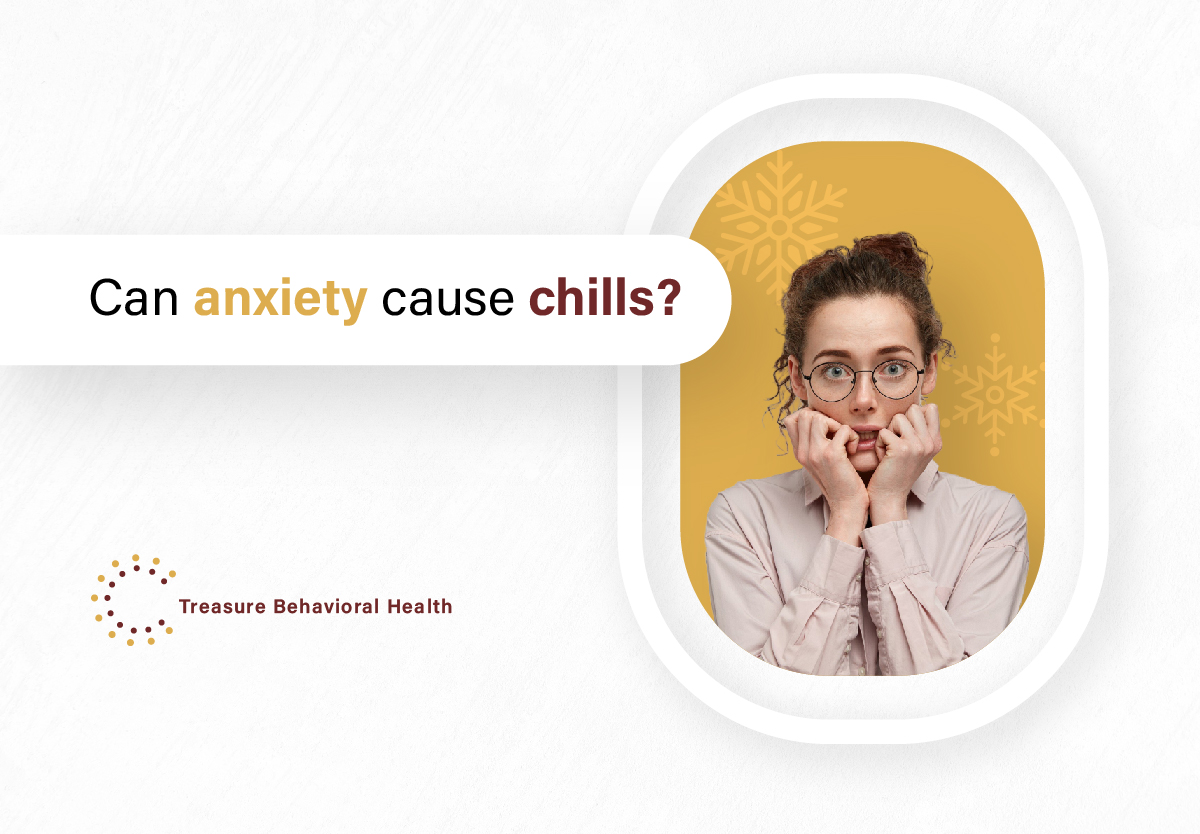Does Anxiety Cause Chills
Are you looking for the answer to the question can anxiety cause chills?
When we are stressed, our bodies enter “fight, flight, or freeze” mode, which can make us feel cold.
Chills happen to everyone at different times, and they are usually caused by being cold. However, chills can also be a symptom of anxiety. Anxiety can slow down blood flow, which can make you feel cold.
You might start shaking and shivering if you have the chills because of stress. When you are stressed, these signs can make you feel like you cannot control your body.
You are not the only one who gets chills when you are stressed. There are ways to help manage this symptom.
Let’s look over it.
Are you tired of your anxiety and want to get rid of it? If so, Dr Roberta Iyamu at Treasure Behavioral Health will know what you are going through.
Understanding Anxiety
It is normal to feel anxious when you are under a lot of stress, and it can even help you avoid danger.
But anxiety that lasts for a long time or is too much to handle can get in the way of daily life.
There are many different kinds of anxiety disorders, such as:
- Generalized anxiety disorder (GAD)
- Panic disorder
- Social anxiety disorder
- Specific phobias
Can Anxiety Cause Chills?F
Do you get chills with anxiety? Yes, anxiety can lead to various physical symptoms, including chills, but it’s not a universal experience for everyone with anxiety.
If you are experiencing anxiety chills, you might notice:
- Shaking
- Shivery shakes
- Cold
- Sweating
How Anxiety Causes Chills
Chills are usually linked to being cold, but when someone is anxious, they can happen even if it is warm outside. These things can happen when you are stressed and give you chills:
- Adrenaline Surge: When someone is anxious, their body releases adrenaline, which can narrow their blood vessels. This tightening can cause your skin temperature to drop, which can make you feel cold and give you chills.
- Hyperventilation: Quick, shallow breathing, also known as hyperventilation, can happen when you are anxious. When you hyperventilate, you lower the amount of carbon dioxide in your blood. This can make you feel dizzy, tingly, and cold.
- Muscle Tension: Muscle tension caused by anxiety can make you feel shaky or give you muscle spasms, which can feel like chills.
- Sweating: Being anxious can make you sweat a lot. As sweat evaporates, it cools the skin, which could make you feel cold.
- Fight or Flight Response: The body’s fight or flight response can change many things physiologically, such as body temperature changes that can cause chills.
Why Do I get Cold When I’m Anxious
How does this happen? When you are anxious, your body’s temperature regulation can get a bit confused, causing you to feel either too hot or too cold. This sensation of chills or sweating can occur during specific types of anxiety, like panic attacks or certain phobias.
During moments of anxiety, your brain goes into “fight, flight, or freeze” mode, trying to protect you.
So, if you suddenly feel sweaty and then start shivering, it’s your brain’s way of trying to regulate what’s happening inside your body.
In simpler terms, anxiety chills could be your body’s way of reacting to the physical tension and nervousness that often come with anxiety.
How to Stop Anxiety Chills
- Breathing Exercises
Deep breathing exercises can help lower hyperventilation and the symptoms that come with it, such as chills. Take slow, deep breaths in through your nose, hold them for a few seconds, and then let them out slowly through your mouth.
- Relaxation Techniques
Progressive muscle relaxation, yoga, and meditation are some techniques that can help lower overall stress and muscle tension, which can make chills less likely.
- Stay Warm
If you get chills, wrap up in a blanket or wear warm clothes to stay warm. This can help fight the cold feeling that comes from stress.
- Regular Exercise
Being active on a regular basis can help you deal with anxiety by lowering stress hormones and making you feel more relaxed.
- Professional Help
If your anxiety and its physical symptoms are making your life very hard, you might want to talk to a mental health professional. Medications and therapies like cognitive-behavioral therapy (CBT) can help people with anxiety disorders.
Conclusion- Can anxiety cause chills?
Chills are a real sign of anxiety because they are the body’s complicated way of reacting to stress.
If you know why you get chills and how to deal with them, you can feel more in charge when anxiety strikes.
If your anxiety and the physical symptoms of it are too much for you to handle, do not be afraid to get help from a professional. You can deal with anxiety and make your life better if you get the right help and advice.
FAQs
Are anxiety chills dangerous?
No, anxiety chills are not harmful. They are a normal part of the body’s response to anxiety and usually subside once the anxiety decreases.
Can anxiety chills be confused with other conditions?
Yes, anxiety chills can be mistaken for signs of other health problems, like a fever or an infection.
It is important to tell the difference between anxiety chills and these other conditions so that the right diagnosis and treatment can be given.
Can anxiety chills be part of a panic attack?
It is possible for anxiety chills to happen during a panic attack. Understanding and dealing with these symptoms will be easier if you see this link.


No comment